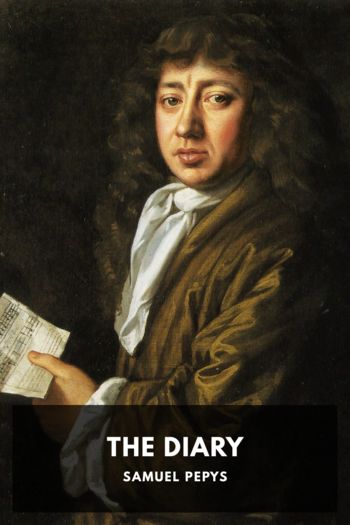The Diary - Samuel Pepys (red white and royal blue hardcover txt) 📗

- Author: Samuel Pepys
Book online «The Diary - Samuel Pepys (red white and royal blue hardcover txt) 📗». Author Samuel Pepys
↩
No Dr. Floyd, or Lloyd, was admitted into the Royal Society at this time. At the meeting on November 21st Mons. Leyonberg, resident from the King of Sweden, and Mr. Soame were elected and admitted, and Count Ubaldini, Sir Charles Berkeley, and Mr. Oudart were elected. ↩
John Cosin, Master of Peter House and Dean of Peterborough in the time of Charles I; Bishop of Durham, 1660–72. Died January 13th, 1671–72, aged seventy-eight. ↩
Edward Reynolds, Bishop of Norwich, 1661–76. He died July 28th, 1676, aged seventy-six. ↩
Probably Herbert Croft. See November 16th. ↩
The protest made in the House of Lords (November 20th, 1667) to the negativing of the question for the committal of Lord Clarendon was signed by the Dukes of Buckingham and Albemarle and twenty-five other peers. Four reasons are given for the protest (Protests of the Lords, ed. J. E. Thorold Rogers, 1875, vol. i, p. 34). ↩
The Royal Society, meeting at Gresham College. ↩
This was Arthur Coga, who had studied at Cambridge, and was said to be a bachelor of divinity. He was indigent, and “looked upon as a very freakish and extravagant man.” Dr. King, in a letter to the Hon. Robert Boyle, remarks “that Mr. Coga was about thirty-two years of age; that he spoke Latin well, when he was in company, which he liked, but that his brain was sometimes a little too warm.” The experiment was performed on November 23rd, 1667, by Dr. King, at Arundel House, in the presence of many spectators of quality, and four or five physicians. Coga wrote a description of his own case in Latin, and when asked why he had not the blood of some other creature, instead of that of a sheep, transfused into him, answered, “Sanguis ovis symbolicam quandam facultatem habet cum sanguine Christi, quia Christus est agnus Dei” (Birch’s History of the Royal Society, vol. ii, pp. 214–16). Coga was the first person in England to be experimented upon; previous experiments were made by the transfusion of the blood of one dog into another. See November 14th, 1666. ↩
This anecdote of Dr. Caius is given in Health’s Improvement, or Rules [for] Preparing All Sorts of Food, by Thomas Mufett; Corrected and Enlarged by Christopher Bennet, 1655, p. 123. ↩
As sponsor at the christening. ↩
Richard Cooling, Clerk of the Privy Council, and secretary to the Earl of Manchester when appointed Lord Chamberlain in 1660. He acted as secretary to the Earl of Arlington during his tenure of the office of Lord Chamberlain (1674–80). He died June 19th, 1697. ↩
Selden’s executors were Matthew Hale, John Vaughan, and Rowland Jewkes, here alluded to, who was buried in the Temple Church in 1665. His monument is now in the triforium. Selden’s monument, consisting of a slab of black marble, was removed in the summer of 1895 from the left of the altar to the southwest corner of the church, near where the “saints’ bell” was once rung, as he was buried in this spot. The monument has been enclosed in a new alabaster frame.
“His grave was about ten foot deepe or better, walled up a good way with brick, with which also the bottome was paved, but the sides at the bottome for about two foot high were of black polished marble, wherein his coffin (covered with black bayes) lyeth, and upon that wall of marble was presently let downe a huge black marble stone of great thicknesse, with this inscription: ‘Hic jacet corpus Johannis Seldeni, qui obijt 30 die Novembris, 1654.’ ”
Aubrey’s Lives, vol. iii, p. 533↩
Warrs with Forregen (Sic) Princes Dangerous to Our Commonwealth, or Reasons for Forreign Wars Answered. London, 1657. 8vo. ↩
The House resolved that the judgment given, 5th Car. I, against Sir John Elliot, Denzill Hollis, and Benjamin Valentine, in the King’s Bench, was illegal, and against the freedom and privileges of Parliament. —B. ↩
David Lloyd’s Memoires of the Lives, Actions, Sufferings, and Deaths of those noble, reverend, and excellent personages who suffered by death, sequestration, decimation, or otherwise for the Protestant religion and the great principle thereof, allegiance to their soveraigne in our late intestine wars. … 1668. ↩
See November 15th, 1667. Sir John Chicheley was in command of the Fairfax in 1666, and of the Rupert in 1668. He subsequently was advanced to be rear-admiral, and he held several posts of importance. He died May, 1691. ↩
The Mistaken Beauty; or, the Lyar, a comedy, taken from the Menteur of Corneille; printed, in 1661, by its second title only, and without any author’s name. Afterwards pubHshed as The Mistaken Beauty in 16S5. ↩
A male cat. “Gib” is a contraction of the Christian name Gilbert (Old French), “Tibert.”
“I am melancholy as a gib-cat.”
Shakespeare, 1 Henry IV, act i, sc. 3Gib alone is also used, and a verb made from it—“to gib,” or act like a cat. ↩
Of the Royal Society. Creed was chosen a member of council this year. ↩
Carey House was probably the Canary House, a much frequented house situated “between the Feathers tavern and Long’s Coffee house on the east side of Exeter ’Change.” There is a token of the Canary House dated 1665. See Boyne’s Tokens, ed. Williamson, vol. i, p. 760. ↩
Dr. Robert Mossum. See note 94 and note 149. ↩
Bishop Wilkins’s





Comments (0)